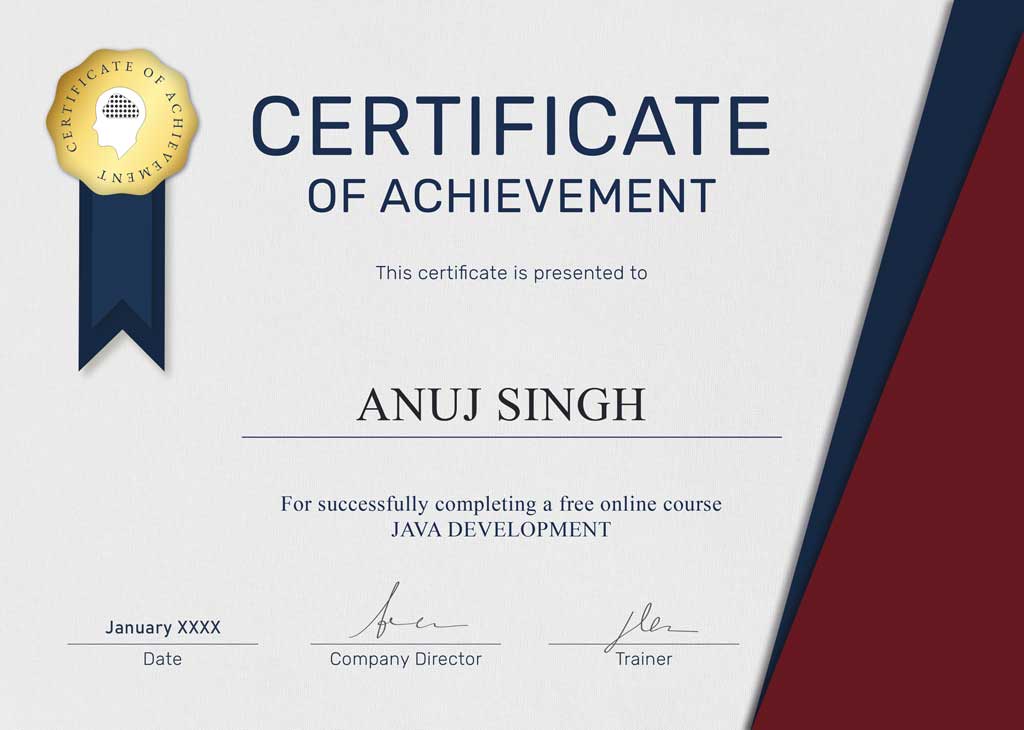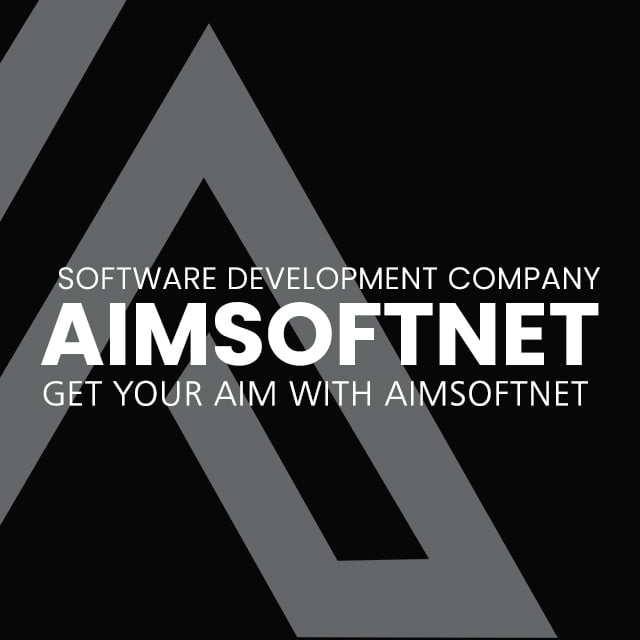Java Certification Training Course
- 4.45
- 7.2K+ Learners
- Beginner
This Full Stack Java Developer Course in India is designed to give you the essence of front-end, middleware, and back-end Java web developer technologies. Java Certification Training Course You will learn to build an end-to-end application, test and deploy code, store data using MongoDB, and much more. But actually, Java Certification Training Course it’s one of the easy and interesting language to learn. If you are trained by professionals and industry-experienced trainer in perfect way then learning Java becomes great.

Why Join This Full Stack Java Certification Training Program
Secure exciting full stack developer jobs in top companies. Get a 100% refund if you’re not able to land a job within 180 days of graduation.
Customized career mentoring sessions, resume building, 1:1 mock interviews, and regular feedback on regular classroom program.
Our mission is clear. Exclusive job portal is an access to exclusive job portal to help you find your dream job IT Sector industry.
Engage in top notch curriculum, assessments and projects to enhance your skills and profile to better full stack developer.

EXCELLENT
Based on 57 reviews
 Rama Shankar YadavBest PHP Institute in Lucknow
Rama Shankar YadavBest PHP Institute in Lucknowawesome sessions, Hiren has been very responsive , helped to clear all queries to the point. Wishing you Hiren and team members a great future and all the success
 Prem KumarPHP program with Aimsoftnet was an enlightening experience
Prem KumarPHP program with Aimsoftnet was an enlightening experienceCompleting the PHP program with Aimsoftnet was an enlightening experience. From the insights of mentors, to the lively conversations in the class, learning was continuous.Thank you, Harsh Sir,so much for your brilliant tuition and support all throughout the course!
 Abhishek kumarThey are best PHP Faculties in Lucknow
Abhishek kumarThey are best PHP Faculties in LucknowIf you want knowledge and creativity you can come to AIMSOFTNET. They are best PHP Faculties in Lucknow. My career options have increased and all credits goes to AIMSOFTNET.
 Afjal HusainBest PHP Institute in Lucknow
Afjal HusainBest PHP Institute in LucknowGreat classes. Learned a lot about Programming Language.
Course Content
Learning Objectives: Creating 1D Array, Defining Functions, Understanding the concepts of Function Overloading, Implementing the concept of String buffer
Topics
- Introduction to Java
- Bytecode
- Class Files
- Compilation Process
- Data types, and Operations
- if conditions
- Loops – for
- while and do while
Learning Objectives:
- Implementation of the concept of OOP
- Creating program on parameterized Constructors
- Use Abstract Method in a program.
Topics:
- Arrays – Single Dimensional and Multidimensional arrays
- Functions
- Function with Arguments
- Function Overloading
- The concept of Static Polymorphism
- String Handling – String
- StringBuffer Classes
Learning Objectives:
- Understanding the usage of Interface and packages
- Exception Handling in Java
Topics:
- Packages and Interfaces
- Access Specifiers: Public, Private, Protected and Package
- Exception Handling: Try, Catch, Finally, Throw and Throws
- Multi-Threading: Runnable Interface, Extending a Thread Class, Synchronization in Threads
Learning Objectives:
- Convert primitives into objects & vice versa using Wrapper Class
- Copy one File into another using I/O operations
- Creating ArrayList
- Using Vectors
Topics
- Wrapper Classes and Inner Classes: Integer, Character, Boolean, Float etc
- Applet Programs: How to write UI programs with Applet, Java.lang, Java.io, Java.util
- Collections: ArrayList, Vector, HashSet, TreeSet, HashMap, HashTable
Learning Objectives:
- Creating a SOAP based Web Service
- Creating RESTful Web Service
Topics
- Introduction to Web Services
- WSDL file
- WSDL and UDDI
- SOAP, RESTful Web Service
- JAX-WS Implementation
Learning Objectives:
- Editing ,Viewing XML Files
- DOM Parsing
- SAX parsing
Topics
- Introduction to XML
- Writing XML files
- DOM Parser – Writing into an XML file and Parsing an XML file
- SAX Parser, XSL
Learning Objectives:
- Creating Table in Database
- Updating Record in Database
- Calling Stored Procedures
- Perform Batch Processing with Transaction Management technique
Topics
- Introduction to SQL: Connect, Insert, Update, Delete, Select
- Introduction to JDBC and Architecture of JDBC
- Types of Drivers: Type 1/2/3/4 drivers
- Insert/Update/Delete/Select Operations using JDBC
- Batch Processing Transaction
- Management: Commit and Rollback
Learning Objectives:
- GenericServlet Program
- Use of Filters
Topics
- Introduction to Web Technologies
- Type of Servlets: Generic and Http Servlet
- Request Dispatchers: Forward and Include
- 4 types of Session Tracking and Filters
Learning Objectives:
- Accessing Cookies
- Handling Sessions
- JSP & JDBC Interaction with Database
Topics
- Introduction to JSP
- Architecture of JSP
- tags (Scripts, declarative, expression)
- Implicit objects
- JSP Directives
- JSP and JDBC
Learning Objectives:
- Creating a Session Factory
- Batch processing
- Using Inheritance in Hibernate
Topics
- Introduction to Hibernate
- Architecture of Hibernate
- Database Operations: Insert/Update/Delete/Select
- Inheritance
- Collections
- HQL and Restrictions
- Caching in Hibernate
Learning Objectives:
- Using BeanPost Processor
- Using Spring DI Collections
- Using Autowiring
Topics
- Introduction to Spring Framework
- Architecture
- Display a Sample Message
- IoC Containers
- Bean Definition
- Bean Scopes
- Bean Post Processors
- Dependency Injection Auto-Wiring
Learning Objectives:
- Demonstrate use of Aop concept with Spring
- Establish database connection using Spring with JDBC
- Use Hibernate with Spring
Topics
- Aspect Oriented Programming (AOP)
- Integrating Spring framework with Hibernate
- Transaction Management
- Ajax Framework and Design Patterns: DAO, DTO, MVC
- Intercepting filters
- Front Controller
- Business Delegate
Learning Objectives:
- Understand all basic concepts of SOA ,SOA Services
Topics
- Introduction to SOA
- SOA Architecture
- Business layer of SOA
- Advantages of SOA
- What is Contract
- Address, and Binding in SOA
- Composition of Service
- Relation between SOA and Web Services
Learning Objectives:
- Creating a SOAP based Web Service
- Creating RESTful Web Service
Topics
- Introduction to Web Services
- WSDL file
- WSDL and UDDI
- SOAP, RESTfulWeb Service
- JAX-WS Implementation
Live Online Training (Duration : 6 Months)
1-on-1 Public
- Duration : 2 Hours / Day
- 1-on-1 Public
- Live Class Online
- One Year Full Support
Group Training
- Duration : 2 Hours / Day
- 15+ Student Group
- Live Class Online Week Days
- Group Discount Available Offer
Exam & Certification Java Certification Training Course
To obtain the Java training course certification, you must:
- Complete 85 percent of the online self-learning course
You must have a computer with:
- Chrome or Chromium browser
- Strong internet access
- Webcam
- Microphone, speakers, and headset
Beginning with the proper education is the most important and ideal first step toward becoming a successful JAVA developer. A candidate should generally be required to have a Bachelor’s degree in computer science or any other discipline (not compulsory) to work as a JAVA developer. Aimsoftnet JAVA certification course is professionally developed to assist you in gaining all information you need to start your career path as a JAVA developer or to create your programming abilities utilizing the world’s most common technologies.

FAQ's Java Certification Training Course
Java is a good precursor to other languages like C#, C++. Learning Java can help you get started with your career in IT. Also, learning Java will help you think like a programmer. It will teach you the underpinnings of programming and lay a solid foundation. This is why most beginners tend to learn Java first and then move on to other technologies. If you have also made up your mind to learn Java online, feel free to reach out to us.
Apparently, no. Our job assistance program is aimed at helping you land in your dream job. It offers a potential opportunity for you to explore various competitive openings in the corporate world and find a well-paid job, matching your profile. The final decision on hiring will always be based on your performance in the interview and the requirements of the recruiter.

Government Certifed

#4 Java Certification Training Course

#3 Java Certification Training Course

#3 Java Certification Training Course

Google Certified Company

Google my Business Verified

Google AdWords Certified

